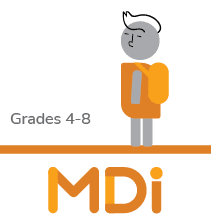

The Youth Development Instrument: Overview
Helping to identify individual and contextual resources, opportunities, and practices that affect positive youth development.
The YDI collects population-level youth development data that may be broadly used to better understand the developmental trends, health, and well-being of adolescents in British Columbia (BC). The YDI is administered annually in schools across BC. Since piloting in 2020, over 50,000 youth in BC have participated in the YDI to date.
The development of the YDI has been an iterative process. Each year the YDI teams seeks feedback from youth themselves (through focus groups, student feedback surveys, and our YDI Youth Advisory Council), our Provincial Advisory Board, and community partners in the fields of education, health care, and youth mental health advocacy to improve the instrument and its relevance. Thus, YDI questions are updated from year to year so we can better understand the current issues that impact youth well-being and how we can act to better support their thriving. Learn More about the YDI at the Chart Lab website.
MADE IN BC
Led by researchers at Simon Fraser University in collaboration with HELP and the BC Centre for Disease Control.
SELF-REPORTED
A self-reported questionnaire offered to students in Grades 10-12.
ONLINE QUESTIONNAIRE
Can be completed online at school in approximately 40 minutes.
SUPPORTING ADOLESCENTS
The YDI offers insights into the health and well-being of young people in five areas: social and emotional development, learning and engagement, social well-being, physical and mental well-being, and navigating the world.
BENEFITS OF THE YDI
The YDI champions adolescents’ rights, ensuring their perspectives are included in matters that impact them. YDI results are mobilized into action to influence policy and practices that impact youth health and well-being.
YDI IS VOLUNTARY
Students are informed of their research rights prior to participation. They can choose not to participate in the YDI altogether or skip any questions they don’t want to answer if they choose to take part.
YDI Dimensions & Subdomains
Data collected from the YDI offer insight into the health and wellbeing of young people through the survey’s strengths-based approach and emphasis on developmental assets such as positive childhood experiences and positive mental health. These assets, also known as ‘cross-cutting domains’, span the YDI’s five dimensions: Social and Emotional Development, Social Well-being, Learning Environment and Engagement, Physical and Mental Well-being, and Navigating the World. Each of these dimensions is divided into several domains and subdomains that ask questions about myriad emotions, thoughts, perspectives, behaviours, and experiences. These five dimensions strategically identify individual and contextual resources, opportunities, and practices that foster or hinder positive youth development. In addition, using data linkages, researchers can monitor how responses change over the life course and map out how current youth experiences effectively shape trajectories into emerging adulthood. In this way, the YDI provides a means to inform actionable policies and practices that support healthy trajectories across the lifespan.
Widening the Lens: YDI and the Child Development Monitoring System
The YDI is part of a collection of tools designed to gather data at critical transition times in across childhood and adolescence. The YDI, led by researchers in the CHART lab at Simon Fraser University, is part of the Child Development Monitoring System, which includes the Toddler Development Instrument (TDI), the Childhood Experiences Questionnaire (CHEQ), the Early Years Development Instrument (EDI) and the Middle Years Development Instrument (MDI). These questionnaires gather information on both child and adolescent development and the contextual factors that influence development, specifically experiences and environments. This Monitoring System is a foundation for high-quality research and for informed policy and program decision-making.




